- Home
- China Miéville
Looking for Jake: Stories Page 14
Looking for Jake: Stories Read online
Page 14
“People don’t fucking move, man,” he said, incomprehensibly.
I arranged to meet him after work. He sounded a bit distracted, a bit miserable even.
“Do you play games, man?” he said. “N64?”
“I’ve got a Playstation,” I told him.
“Playstation licks shit, man,” he told me. “Bullshit digital controls. I’ll give you the ads, though. Playstation ads sing sweet hymns, but you want a fucking analog control stick, or you’re playing once removed. You know anyone with N64?”
As soon as we met he handed me a little grey plastic square. It was a game pack for a Nintendo 64 system, but it was rough-cast and imperfectly finished, its seam bizarrely ragged. It had no label, only a sticker scrawled with illegible handwriting.
“What’s this?” I asked.
“Find someone with N64,” he said. “Project of mine.”
We talked for a couple of hours. I asked Aykan what he did for a living. He did that dismissive smoking thing again. He muttered about computer consultancy and web design. I thought the internet was dead, I said. He agreed fervently.
I asked him what nanotech stuff he was doing, and he became ragged with enthusiasm. He caught me with crazy looks and grinned at odd intervals, so I couldn’t tell if he was bullshitting me.
“Don’t talk to me about little miniature fucking arterial cleaning robots, don’t fucking talk to me about medical reconstruction, or microwhateverthefucks to clean up oil slicks, OK? That’s bullshit to get people on board. What’s going to be big in nanotech? Eh? Like any other fucking thing . . .” He banged the table and slopped beer. “The money’s in games.”
Aykan had extraordinary schemes. He told me about his prototype. It was crude, he said, but it was a start. “It’s old school meets new school,” he kept saying. “Kids with fucking conkers, in the playground.” The game was called Blood Battle, or Bloody Hell, or Bloodwar. He hadn’t decided.
“You buy a little home injection kit, like you’re diabetic. And you build up your own serum from the pack provided. Like when you play a wargame you choose how many fuckers on horseback and how many artillery, right? Well, you have different vials full of microbots that interact with your blood, each type with different defences and attacks, and there are miniature repair robots like medics, all of these fuckers microsize. And you make yourself a blood army, with electrical frontline, chemical attack forces, good defences, whatever you’ve decided.
“Then you go to the playground and you meet your little friend who’s also bought Bloodwar, and you prick your fingers, right, like you’re going to be blood brothers, and you each squeeze out a drop into a special dish, and you fucking mix ’em up.” I stared at him incredulously while he grinned and smoked. “And then you sit back and watch the blood shimmer and bubble and move about. Because there’s a war on.” He grinned for a long time.
“How do you know who’s won?” I asked eventually.
“The dish,” he said. “Comes with a little display and speakers in the base. Picks up signals from the ’bots and amplifies them. You hear battle sounds and your troops reporting casualties, and at the end you get a score and you see who’s won.”
He sat back a minute and smoked some more, watching me. I tried to think of something sardonic to say, but was defeated. He leaned in suddenly and pulled out a little Swiss army knife.
“I’ll show you,” he said intensely. “You up for it? I can show you now. I’m primed. We know you’ll lose because you’ve got no troops, but you’ll see how it works.” The knife waited above his thumb, and he gazed at me for the go-ahead. I hesitated and shook my head. I couldn’t tell if he was serious or not, if he’d actually injected himself with these lunatic game-pieces, but he was weirding me out.
He had other ideas. There were spin-offs for Bloodwar, and there were other more complicated games, involving outside equipment like airport metal detectors that you walked through, that set off particular reactions from your tiny little internal robots. But Bloodwar was his favourite.
I gave him my email address and thanked him for the N64 pack. He wouldn’t tell me where he lived, but he gave me his mobile number. I called it at seven the next morning.
“Jesus fucking Christ, Aykan,” I said. “This game, thing, whatever . . . it’s total genius.”
I had been curious enough to rent a console from Blockbuster on my way home, to play the thing he’d given me.
It was utterly extraordinary. It was not a game. It was a totally immersing piece of art, a multilayered environment that passed through anarchic and biting political commentary, bleak dreamscapes, erotic staging posts. There was no “gameplay,” only exploration, of the environment, of the conspiracies being unmasked. The viewpoint shifted and changed vertiginously. There were moments of shocking power.
I was stunned. I had pulled an all-nighter, and called him as early as I thought I could get away with.
“What is this shit?” I asked. “When’s it coming out? I’ll buy a fucking console just for this.”
“It’s not coming out, man,” Aykan said. He sounded quite awake. “It’s just some shit I did. Nintendo are bastards, man,” he said. “They’d never licence it. No fucker’d produce it anyway. It’s just for my friends. The hardest thing, let me tell you, the hardest thing isn’t the programming, it’s making the housing. If they read off CDs or whatever, no fucking problem. But putting the software into that poxy stupid little plastic square, and making it so it’ll fit in the casing with all the right connectors. That’s the hard bit. That’s why I’m not doing that shit anymore. Boring.”
I still own it, Aykan’s guerrilla software, his illicit work of art. I still play it. Two years on I’m still discovering new levels, new layers. Later, before he disappeared, Aykan translated the scrawled title for me: We Deserve Better Than This.
Aykan’s occasional emails to me often included web addresses for me to look up. I say Aykan’s emails, although no name ever appeared in the “Sender” column, and they were never signed. Whenever I tried to reply to them, they would register as coming from a nonsense address, and the messages would bounce back to me. But Aykan never denied the emails were his, and sometimes even asked me if I’d received certain of them. He irritably dismissed questions about how or why he sent them anonymously. If I wanted to contact him, I had to do it by phone.
This was a time when mass-circulation emails were getting out of hand. Every day I’d get one or two urls to look up. Sometimes they were pornographic, with a message like “Did you know that was possible???!!!” from some sad lad or other I vaguely knew. More often they were links to some weird news story or other. Usually they looked too dull to chase up.
Aykan’s, though, I always checked. They were pretty extraordinary. Essays, art pieces, things like that.
Sometimes he provided a password to get into hidden pages online, and when I visited them they were incomprehensible internal reports that looked very much like governments talking to governments, or rebel groups talking to rebels. I couldn’t tell if they were hoaxes, but if not, I was rather alarmed.
“What’s all this shit you keep sending me?” I demanded.
“Interesting, huh?” He sniggered, and put the phone down.
Sometimes he directed me to one or another of his online projects. That was how I realised that Aykan was a virtuoso of programming. Once, on one of our infrequent rendezvous, I called him a hacker. He burst out laughing, then got very angry with me.
“Fucking hacker?” He laughed again. “Fucking hacker? Listen bro, you’re not talking to some sebum-faced little sixteen-year-old geekboy with wank-stained pants who calls himself Dev-L.” He swore furiously. “I’m not a fucking hacker, man, I’m a fucking artist, I’m a hardworking wage-slave, I’m a concerned motherfucking citizen, whatever you want, but I’m not a fucking hacker.”
I didn’t care what he wanted to call himself. Whatever he thought he was, he left me awestruck—disbelieving, really, utterly bewildered—with wha
t he could do.
“What search engine do you use?” he wrote to me once. “How often does your name come up? Try it now and then again tomorrow morning.”
According to searchsites.com I appeared on seven websites, all of them work-related rubbish. When I typed in my name again the next day, I was nowhere. I looked up my company’s website and there I was, halfway down the page. But when I ran my name through searchsites or runbot or megawhere, I had no luck. I had become invisible.
“What did you do, you fuck?” I yelled down the phone. I was excited, though, feigning anger badly.
“How’s that, huh? I ran you through my hide engine.” I could hear him smoking. “Don’t worry, man,” he said. “I’ll take you out of it. But it’s good, huh? Tomorrow I think I’m gonna run Jack fucking Straw through it, or maybe every fucking sex-related word I can think of.” He put the phone down.
If he did run those words through his engine, it had stopped working. I checked the next day. But maybe he just hadn’t bothered.
I spoke to Aykan several times, but a couple of months went by without me seeing him.
One morning I found another of his unmarked emails in my inbox. “HAVE YOU SEEN THIS FUCKPIG SCUMSUCKING PIECE OF SHIT?”
I had. It was the homepage of an organisation called An End To Hunger. I had been sent it at least twice already, as a recipient on mass emailings.
The site contained low-key, muted, and simple graphics, with a selection of harrowing statistics about world hunger. There were links to the UN Food Programme, Oxfam, and so on. But what made it such a popular site was its push-button charity donation.
Once per day, anyone visiting the site could click a little toggle, and in the words of the website, “feed the hungry.” Alongside the button was a list of sponsors—all very dignified, no logos or bells or whistles, just the name of the company and a link to its homepage. Each sponsor would donate half a cent per click, which was roughly equivalent to half a cup of rice, or maize or whatever.
It all made me feel a bit uneasy, like corporate charity usually did. When I first saw the site I’d pressed the button. It had seemed churlish not to. But I hadn’t visited it since, and I was getting irritated with people recommending it to me.
I called Aykan. He was incandescent.
“I’ve seen the site,” I told him. “Bit gruesome, isn’t it?”
“Gruesome?” he shouted. “It’s fucking sick is what it is. It’s fucking beyond beyond, man. I mean, forget ‘politics lite,’ this shit couldn’t be parodied.”
“I keep getting emails recommending it,” I told him.
“Any motherfucker emails you that reply them right back and tell them to shove it up their arses till it hits the roof of their mouth, yeah? I mean by shit almighty . . . have you read the FAQ? Listen to this. This is fucking verbatim, OK? ‘Can I click the “Give Food” button more than once, and keep making donations?’ ‘We’re sorry!’ ” Aykan’s voice spewed bile. “ ‘We’re real sorry! It’s a shame, but you can’t do that. Our sponsors have agreed for us to count one donation per person per day, and any more would be breaking our agreement.’ ” He made a noise like angry retching.
“Fuck ’em, bro,” he said. “They tell us we can’t be naughty and do it too often?” I didn’t tell him I had donated that first time. He was making me ashamed.
I murmured something to him, some agreement, some dismissal and condemnation. It wasn’t enough.
“This is fucking war, man,” he said. “This one I can’t let go.”
“Run them through your hide engine,” I suggested vaguely.
“What?” he said. “What the fuck you talking about? Don’t talk horsefuck, man. I want them down and dead. Time for the big fucking guns, hombre,” he said, and put the phone down. I tried to call him back but he didn’t pick up.
Two days later I got another email.
“Try visiting you shitting know where,” it said. I did, and An End To Hunger would not come up. The browser couldn’t find it. I tried again at the end of the day and it was back, with a small, pious note about how sad they were to be targeted by hackers.
Aykan wouldn’t answer his phone. A week and a half later he called me.
“Man!” he shouted at me. “Go back to the bastards,” he said. “I was . . . you know, I jumped the gun last time. Wasn’t particularly clever, right? But it was like a fucking, what do you call it, I was doing a reconnoitre. But go back now, click the bastard button all you can.”
“What did you do, Aykan?” I said. I was at work, and kept my voice neutral.
“I don’t know how long it’ll last,” he said, “so get all your fucking friends to go visiting. For a short time only the shit-licking sponsors are going to be making a reasonable fucking payout. Ten bucks a fucking click, my friend, none of this half a cent bull. So go give generously.”
It’s impossible to say how much of an impact it had. Certainly for the next day or so I proselytised zealously. An End To Hunger kept it very quiet, when they found out. I like to think that it took the businesses in question the best part of a day to realise that their pledged donations had gone up by around 200,000 percent.
I wondered when Aykan would get bored of these games.
We spoke for a long time on the phone, one evening a fortnight or so later. He sounded exhausted.
“What you up to?” I asked him.
“Waging war, man.”
I suggested that he was wearing himself out, that he should apply himself to other things. He got angry and depressed all at once.
“It really got to me, this one,” he said. “It really got to me. I dunno why, but I can’t . . . This one matters. But . . . I keep hitting the wrong enemy. ‘Corporate sponsors don’t actually care!’ ‘Big business is hypocritical!’ That’s not news to anyfuckingbody. Who doesn’t know? Who gives a fuck about that?
“Do you ever stop to think about them, man?” he said. “Them in the AETH office. What must that do to your head? Like some kind of ghouls, man. What’s that got to do to you?”
I changed the subject several times, but it kept coming back. “I dunno, man . . .” he kept saying. “I dunno what to do . . .”
It may have been the next day that he decided, but it was a good three weeks before he could make it work.
“Go and visit A* E** T* H*****,” the email said. “Click and send the poor starving masses a present. See what happens.”
I went to the site. Apart from a few minor updates, nothing seemed to have changed. I looked for some clue as to what Aykan had done. Eventually I clicked the “Give Food” button and waited.
Nothing happened.
The usual little message, thanking me on behalf of hungry people, appeared. I waited a couple more minutes, then left. Whatever Aykan had planned, I thought, it hadn’t come off.
A couple of hours later I checked my email.
“How the fuck . . .” I said, and paused, shaking my head. “How the fuck, you insane genius bastard, did you do that?”
“You like that?” The connection was terrible, but I could hear that Aykan sounded triumphant. “You fucking like it?”
“I . . . I don’t know. I’m very impressed, whatever.”
I was staring at the message in my inbox. The sender was listed as “Very Hungry Foreign People.”
“Dear Kind Generous Person,” it read. “Thank you so much for your Generous gift of half a cup of wet rice. Our Children will treasure every grain. And do please thank your Kind Organisers at An End To Hunger for organising their rich friends to throw rice at us—that is the advantage of employing Sweatshop labour and trade union busting. That way they can afford rice for us poor people. Whatever you do, do keep sitting back and not asking any questions of them, keep them happy, don’t agitate for any corporate taxes or grassroots control or anything like that which would threaten the large profits that allow them to buy us Cups of Rice. With humble love and thanks, The Hungry.”
“Every motherfucker who clicks the butt
on’s going to get that,” Aykan said.
“How did you do it?”
“It’s a fucking program. I stuck it on the website. It scans your fucking hard disk for what looks like your email address, and sends off the message when you draw attention to yourself by clicking. Try pressing ‘Reply.’ ”
I did. The return address listed was my own.
“It’s very impressive, Aykan,” I said, nodding slowly, wishing someone else had written the letter, made it a bit subtler, maybe edited it a bit. “You’ve done a real number on them.”
“Well it ain’t over yet, bro,” he said. “Watch this space, you know? Watch this fucking space.”
My phone went at five the next morning. I padded nude and confused into the sitting room.
“Man.” It was Aykan, tense and excited.
“What the fuck time is it?” I said, or something like that.
“They’re onto me, man,” he hissed.
“What?” I huddled vaguely on the sofa, rubbed my eyes. Outside, the sky was two-tone. Birds were chirruping imbecilically. “What are you on about?”
“Our fucking philanthropic friends, man,” he whispered tersely. “The concerned folk over at Feed The World central, you know? They’ve rumbled me. They’ve found me.”
“How do you know?” I said. “Have they contacted you?”
“No no,” he said. “They wouldn’t do that—that would be admitting what the fuck was up. No, I was watching them online, and I can see them tracking me. They can already tell what country I’m in.”
“What do you mean?” I said. I was fully awake now. “Are you intercepting their email? Are you crazy?”
“Oh man, there’s a hundred fucking million things you can do, read their messages, watch who they’re watching, bounce off internal memos, keep tabs on their automatic defences . . . Trust me on this: they’re looking for me.” There was a silence. “They may even have found me.”

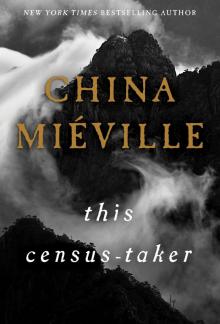 This Census-Taker
This Census-Taker Jack
Jack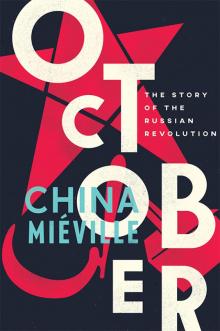 October: The Story of the Russian Revolution
October: The Story of the Russian Revolution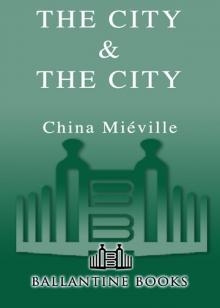 The City & the City
The City & the City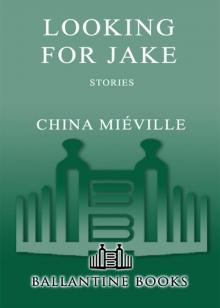 Looking for Jake: Stories
Looking for Jake: Stories Perdido Street Station
Perdido Street Station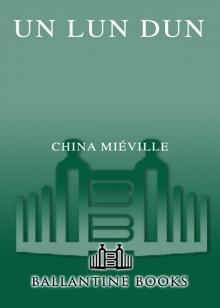 Un Lun Dun
Un Lun Dun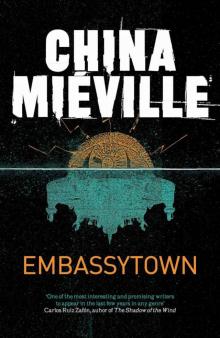 Embassytown
Embassytown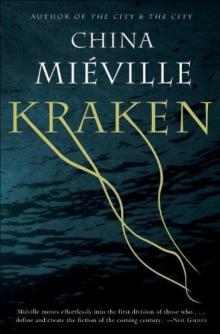 Kraken
Kraken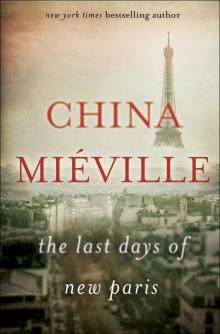 The Last Days of New Paris
The Last Days of New Paris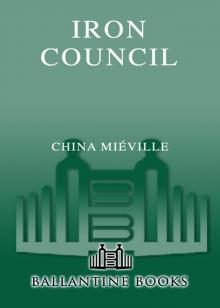 Iron Council
Iron Council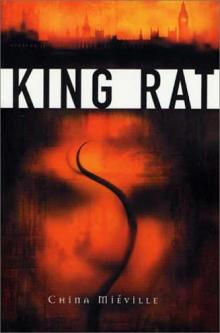 King Rat
King Rat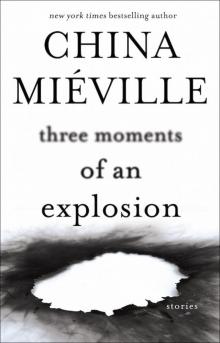 Three Moments of an Explosion
Three Moments of an Explosion London's Overthrow
London's Overthrow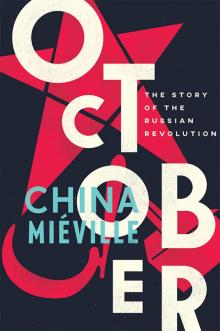 October
October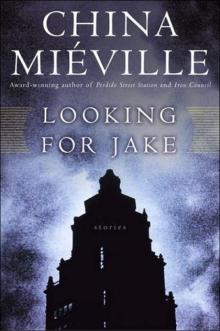 Jack (new crobuzon)
Jack (new crobuzon) Looking for Jake and Other Stories
Looking for Jake and Other Stories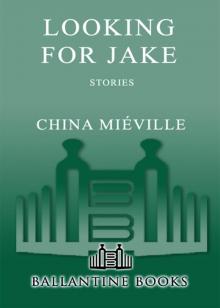 Looking for Jake
Looking for Jake